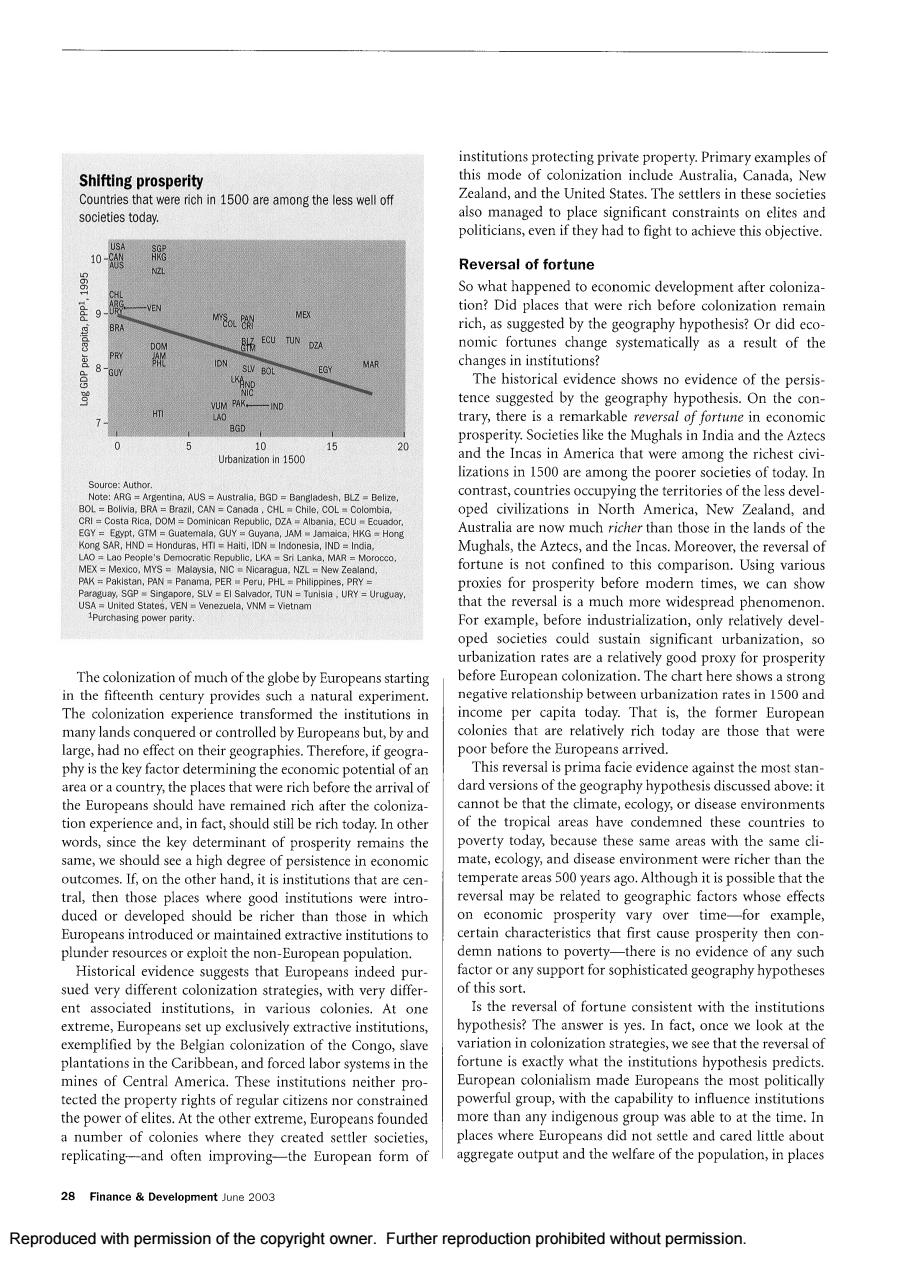正在加载图片...

institutions protecting private property.Primary examples of Shifting prosperity this mode of colonization include Australia,Canada,New Countries that were rich in 1500 are among the less well off Zealand,and the United States.The settlers in these societies societies today. also managed to place significant constraints on elites and politicians,even if they had to fight to achieve this objective. 0 Reversal of fortune So what happened to economic development after coloniza- 是9 L器 MEX tion?Did places that were rich before colonization remain BRA rich,as suggested by the geography hypothesis?Or did eco- DOM ECU TUN DZA nomic fortunes change systematically as a result of the PRY 8-GUY IDN SLV BOL EGY changes in institutions? The historical evidence shows no evidence of the persis- VUM PAK- IND tence suggested by the geography hypothesis.On the con- trary,there is a remarkable reversal of fortune in economic BGD prosperity.Societies like the Mughals in India and the Aztecs 10 15 20 Urbanization in 1500 and the Incas in America that were among the richest civi- lizations in 1500 are among the poorer societies of today.In Source:Author. Note:ARG=Argentina,AUS=Australia,BGD=Bangladesh,BLZ-Belize, contrast,countries occupying the territories of the less devel- BOL Bolivia,BRA Brazil,CAN Canada,CHL Chile,COL Colombia, oped civilizations in North America,New Zealand,and CRI Costa Rica,DOM Dominican Republic,DZA Albania,ECU Ecuador EGY=Egypt,GTM Guatemala,GUY Guyana,JAM Jamaica,HKG Hong Australia are now much richer than those in the lands of the Kong SAR,HND Honduras,HTI Haiti,IDN Indonesia,IND India, Mughals,the Aztecs,and the Incas.Moreover,the reversal of LAO Lao People's Democratic Republic,LKA Sri Lanka,MAR Morocco, MEX Mexico,MYS Malaysia,NIC-Nicaragua,NZL New Zealand, fortune is not confined to this comparison.Using various PAK=Pakistan,PAN Panama,PER Peru,PHL=Philippines,PRY= proxies for prosperity before modern times,we can show Paraguay,SGP Singapore.SLV El Salvador,TUN Tunisia,URY Uruguay, USA United States,VEN Venezuela,VNM Vietnam that the reversal is a much more widespread phenomenon. 1Purchasing power parity. For example,before industrialization,only relatively devel- oped societies could sustain significant urbanization,so urbanization rates are a relatively good proxy for prosperity The colonization of much of the globe by Europeans starting before European colonization.The chart here shows a strong in the fifteenth century provides such a natural experiment. negative relationship between urbanization rates in 1500 and The colonization experience transformed the institutions in income per capita today.That is,the former European many lands conquered or controlled by Europeans but,by and colonies that are relatively rich today are those that were large,had no effect on their geographies.Therefore,if geogra- poor before the Europeans arrived. phy is the key factor determining the economic potential of an This reversal is prima facie evidence against the most stan- area or a country,the places that were rich before the arrival of dard versions of the geography hypothesis discussed above:it the Europeans should have remained rich after the coloniza- cannot be that the climate,ecology,or disease environments tion experience and,in fact,should still be rich today.In other of the tropical areas have condemned these countries to words,since the key determinant of prosperity remains the poverty today,because these same areas with the same cli- same,we should see a high degree of persistence in economic mate,ecology,and disease environment were richer than the outcomes.If,on the other hand,it is institutions that are cen- temperate areas 500 years ago.Although it is possible that the tral,then those places where good institutions were intro- reversal may be related to geographic factors whose effects duced or developed should be richer than those in which on economic prosperity vary over time-for example, Europeans introduced or maintained extractive institutions to certain characteristics that first cause prosperity then con- plunder resources or exploit the non-European population. demn nations to poverty-there is no evidence of any such Historical evidence suggests that Europeans indeed pur- factor or any support for sophisticated geography hypotheses sued very different colonization strategies,with very differ- of this sort. ent associated institutions,in various colonies.At one Is the reversal of fortune consistent with the institutions extreme,Europeans set up exclusively extractive institutions, hypothesis?The answer is yes.In fact,once we look at the exemplified by the Belgian colonization of the Congo,slave variation in colonization strategies,we see that the reversal of plantations in the Caribbean,and forced labor systems in the fortune is exactly what the institutions hypothesis predicts. mines of Central America.These institutions neither pro- European colonialism made Europeans the most politically tected the property rights of regular citizens nor constrained powerful group,with the capability to influence institutions the power of elites.At the other extreme,Europeans founded more than any indigenous group was able to at the time.In a number of colonies where they created settler societies, places where Europeans did not settle and cared little about replicating-and often improving-the European form of aggregate output and the welfare of the population,in places 28 Finance Development June 2003 Reproduced with permission of the copyright owner.Further reproduction prohibited without permission.Reproduced with permission of the copyright owner. Further reproduction prohibited without permission